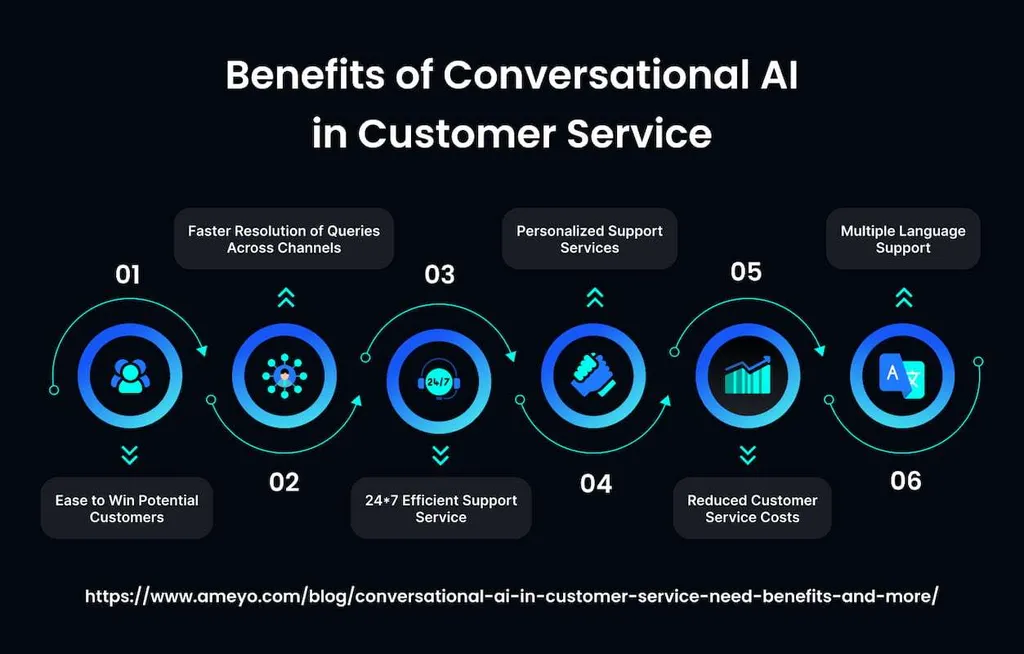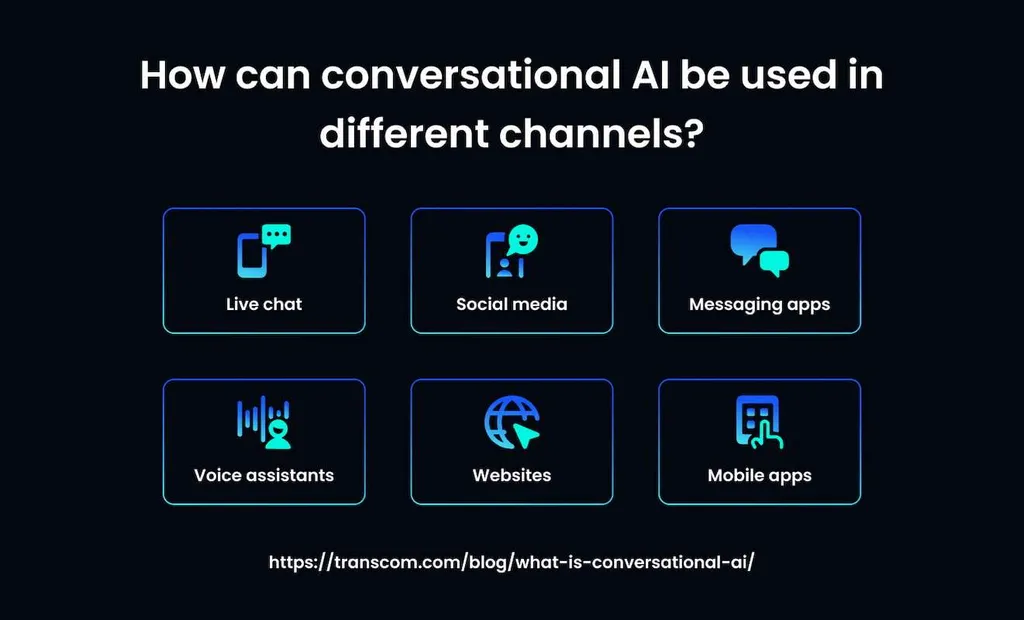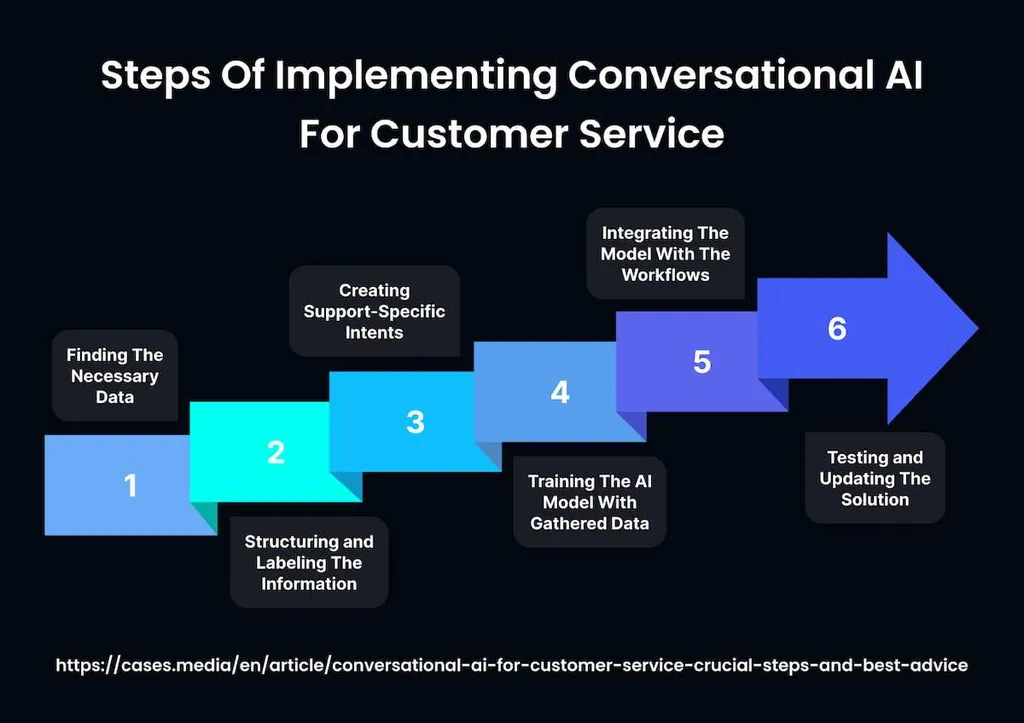Achieving sustainable development necessitates deploying task automation solutions and harnessing the power of Artificial Intelligence (AI) technology. The development of large language models (LLMs) opened new opportunities across multiple industries. Recognizing the increased importance of personalization for building lasting relationships with clientele, businesses deploy algorithm-based tools to provide top-level support. In this guide, we will analyze the essential role of conversational customer service in enhancing brand loyalty. When integrated with legacy systems, such tools process extensive datasets, generate lightning-fast responses, and augment client support practices.
What is Conversational Customer Service?
The term refers to the increased deployment of AI-powered chatbots by CS teams. This allows them to provide 24/7 support across multiple communication channels. The usage of Machine Learning (ML) enables businesses to train LLMs using datasets and fine-tune their performance. AI tools have advanced capabilities and offer accurate interpretations of client queries by putting them in a relevant context.
Designed to recognize subtle signs of dissatisfaction and offer effective solutions to reduce churn, AI bots maintain engaging conversations and tailor their responses depending on the person they communicate with. Their ability to remember the details of past conversations allows them to avoid repeating and achieve higher retention.
In the changing business environment, conversational customer service plays an essential role. It enables enterprises to generate mistake-free replies without any inaccuracies or irrelevant details. Clients expect to get prompt replies to their tickets. The deployment of AI solutions lets firms surpass expectations and build trust. Even though many market participants still have reservations regarding the increased usage of AI, recognizing the upsides of this innovative technology motivates them to invest in the tools that change how brands interact with their audiences.
Why Implement Conversational Customer Service Solutions

Discovering the full potential of AI involves exploring the key upsides of integrating chatbots with traditional apps and systems used by CS teams. Below, we have outlined the main arguments in favor of LLM-powered tools:
- Streamlined client journey: By simplifying access to product details and providing personalized recommendations, firms boost the retention rate. The usage of emojis, documents, and media files in chats expedites onboarding, verification, and account registration. Brands address client needs using popular messengers and social networks, and create a frictionless client experience (CX) by organizing menus and improving the navigation system.
- Stronger loyalty: 90% of consumers expect to receive instant replies when contacting a brand. Meeting their wishes necessitates using conversational AI for customer service teams. MetaDialog builds custom LLMs designed to analyze behavior patterns, buying history, and the characteristics of a target audience. The company’s solutions enable businesses to automate up to 87% of conversations within an hour and increase the number of repeat purchases.
- Multichannel communication: Clients tend to contact brands via different services and messengers. By integrating AI tools with customer relationship management (CRM) software, ventures collect data about consumers’ preferences and maintain an omnichannel presence.
- Standardized internal procedures: The development of a complex system facilitates collaboration between marketing and CS teams, enabling them to use the data collected by chatbots to deliver professional-level services and segment the audience to increase the efficiency of their advertising campaigns. Such tools analyze data in real time and come up with personalized offerings to foster loyalty and trust.
- Enhanced CS quality: By boosting engagement and streamlining access to information, firms achieve higher satisfaction levels. Conversational customer service enables ventures to cultivate a positive brand reputation. AI tools analyze past conversations and use the data provided by buyers to put issues in the right context.
- Reduced expenses: The deployment of conversational AI reduces labor costs. Self-service portals are invaluable for those who prefer to solve issues without external support. By automating tasks, organizations cut operational expenses and achieve higher efficiency.
- Short response time: Virtual assistants generate prompt replies even outside business hours. AI systems provide immediate support without human intervention. By reducing the average resolution time to 20 seconds, MetaDialog caters to the needs of enterprises interested in a seamless CX.
- High efficiency: Unlike human employees, AI bots do not make mistakes. They quickly handle routine tasks enabling agents to fully focus on complex issues.
The implementation of AI products also enables ventures to reduce churn and increase satisfaction.
Best Practices to Enhance Conversational Customer Service
Seeking to establish strong relationships with the clientele, enterprises adopt result-yielding methods to improve the quality of interactions. The development of innovative technologies signifies a pivotal shift in how companies communicate with consumers. Here are the best methods to boost the CS team’s efficiency:
- Deploy AI bots: Building AI chatbots and integrating them with dedicated software allows firms to generate instant replies and process routine tasks with ease.
- Track key metrics: By monitoring the response and resolution times, firms discover obstacles hindering the AI assistants’ performance. MetaDialog develops solutions with measurable effectiveness. The company’s chatbots allow firms to achieve customer service automation and increase the satisfaction rate by 28%.
- Analyze past interactions: By identifying the issues causing dissatisfaction, it becomes possible to improve the quality of CS and predict changes in buying behavior. It allows companies to devise timely interventions to solve buyers’ concerns.
- Educate employees: Organizing training sessions for agents ensures they will be able to serve consumers better. Learning how to make the most out of AI tools is crucial to improving the CS team’s efficiency.
- Develop a recognizable brand’s voice: Communicating with buyers in a natural tone facilitates establishing a stronger connection and receiving an emotional response. When people see that a company cares about their preferences, they are more likely to stay with a brand.
Making clients feel valued is the first step toward expanding the outreach and achieving sustainable growth.
Main Conversational Channels

CS teams utilize different messengers and platforms to offer their assistance. By making it easier to get support, firms demonstrate that they value their clients. Below, we have briefly described the main channels organizations use to serve their clientele:
- Live chats: Instant replies written by a personal assistant remain popular as text-based interactions enhance CX. Chatbots can be integrated with web-based platforms. Besides, they can be programmed to communicate with users via messengers.
- Phone support: Human employees communicate with consumers via phone, which allows them to establish a better connection. With 59% of people indicating that phone conversations remain their favorite way of solving issues, businesses should not disregard this traditional medium. Artificial intelligence for customer service facilitates summarizing calls and creating reports containing the main points mentioned by clients. Advanced systems include live chats, email, and phone services as the main communication channels. AI-powered CRMs process the collected data, which allows agents to have key points from past interactions at their fingertips.
- SMS and messengers: Even though not many people send SMS these days, this channel remains popular among specific audiences. Besides, unlike emails, SMS has better open rates. Similarly, many people prefer WhatsApp to communicate with their friends and relatives and want to be able to contact brands via this messenger. These channels are suitable for expanding the outreach of marketing campaigns and providing support.
- Emails and tickets: If a person is willing to wait for a delayed response or does not have time to solve an issue in real time, they use these methods. Conversational support solutions enable firms to generate eloquent replies containing information that can help buyers make up their minds about a product. AI systems use personalized data to write tailored replies. MetaDialog’s solutions enable firms to improve the productivity of CS teams by 5 times.
- Social media: Buyers love inquiring about offerings via Twitter, Instagram, and other similar services.
- Self-service sites: By adding an extensive FAQ section to a website, companies satisfy the needs of individuals who prefer to solve issues on their own. About 88% of consumers claim that they want to be able to find all the information they need without external help. Adding information about a return policy and other issues is crucial to avoid misunderstandings.
Regardless of the channel, the deployment of AI tools augments the effectiveness of CS solutions.
How to Implement Conversational Customer Service

Devising an efficient strategy before deploying AI tools is the only way to achieve sustainable results. Deploying innovative algorithm-powered tools requires the following steps:
- Getting the support of major stakeholders: CS agents, product managers, and other experts should work together to detect popular queries and discover how to solve issues. Enterprises should train LLMs and educate agents to maximize the effect of AI tools.
- Hire experts with advanced technical backgrounds: The integration of AI systems requires expensive experience. Companies can also outsource this task to third-party providers to save valuable resources.
- Organize data: By using labels, firms categorize the available information to train AI models and make them an integral part of their processes.
- Map client journeys: Removing the obstacles a person may encounter when interacting with a brand allows organizations to provide the highest level of support.
- Add a personal touch to communications: Based on the information from buyers’ profiles and the wishes they voice during conversations, enterprises provide well-crafted responses tailored to their needs.
- Train AI models: Monitoring LLMs’ performance is necessary to identify biases and eliminate security issues.
AI models learn based on interaction experience and improve their responses over time.
How to Enhance Client Interactions
Recognizing the significance of artificial intelligence for customer service, ventures deploy efficient strategies to take their communication with consumers to the next level. Below, we have outlined some tips for those who want to implement the best methods:
- Understand the preferences of a target audience: Studying behaviors allows companies to see how people engage with the brand and devise tailored offerings.
- Analyze the collected data to personalize communication: By considering the history of a buyer’s prior interactions with a brand and the recurring problems they face, one can identify touchpoints that require improvement. As 69% of Gen Z consumers prefer tailored messages, focusing on custom-written content is the right approach to foster trust.
- Build a multichannel support system: People expect to enjoy an omnichannel conversational CX when communicating with companies. It allows them to get answers to their questions regardless of their location, time zones, and schedules. The integration of different channels with a single platform facilitates providing professional support.
- Monitor metrics: By considering such KPIs as response and resolution time, firms detect barriers impacting satisfaction. MetaDialog builds advanced LLMs helping entities to solve large volumes of queries. After communicating with chatbots based on these models, 60% of users decide against escalating issues to human agents.
The ability of AI-powered systems to maintain casual communication enables ventures to develop a unique brand’s voice.
Final Thoughts
By deploying conversational customer service solutions, firms automate processes and strengthen their relationships with clientele. Virtual assistants make it easier to scale up operations and handle tickets 24/7. Setting clear escalation guidelines ensures consumers will be able to contact human employees when they consider it necessary. However, building LLMs from scratch and integrating them with CS apps could be daunting without an extensive technical skillset. MetaDialog has a team of experts who develop AI models designed to provide seamless CX. Get in touch with our professionals now and discover how to surpass the expectations of your audience and maintain meaningful interactions with your clientele.
